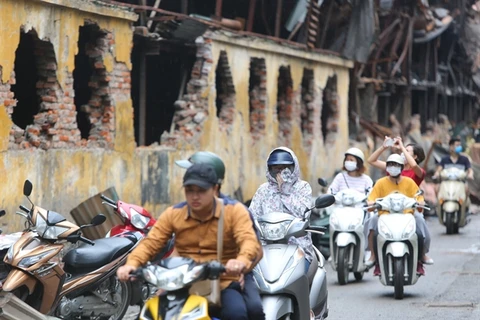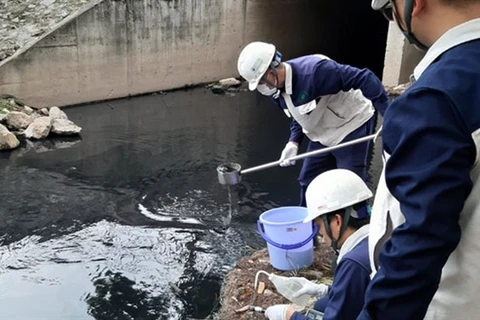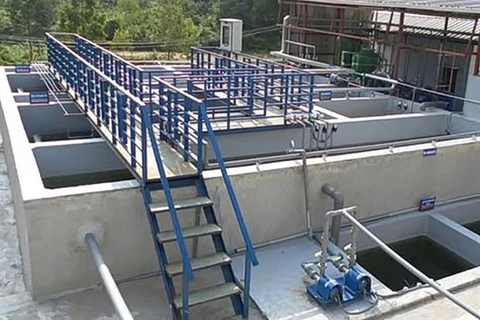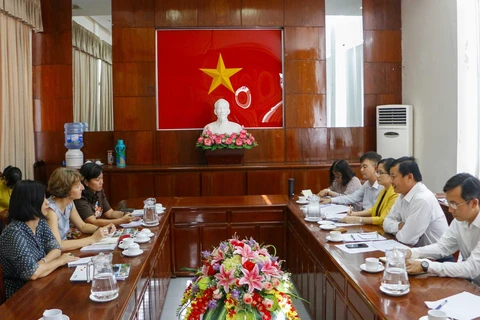Hanoi (VNA) - Chairman of the Hanoi People’s Committee Nguyen Duc Chung has said he will no longer tolerate any delays to the construction of a wastewater treatment plant that is expected to address long-standing water pollution in the increasingly crowded city.
Chung made the comment on February 4 as he inspected the progress of the Yen Xa wastewater treatment plant in the suburban district of Thanh Tri, which is being built with financial support from Japan.
The city’s largest wastewater project, capable of handling 270,000 cu.m of wastewater a day, started in 2016 and was originally slated for completion in 2021. Municipal authorities wanted to push the completion date forward to 2019, but delays in contractor selections have led to missed deadlines.
For years, people in Hanoi have had to put up with the pollution caused by untreated wastewater discharged into the To Lich river, Chung said, referring to the notoriously foul river which has been dubbed the “black river” or “dead river” that authorities have previously tried to restore to its original state but to little effect.
The Yen Xa plant, their latest and most comprehensive effort, has a system that will collect and treat all the wastewater from households and factories along the To Lich river that would otherwise be dumped directly into the waterway.
Once operational, the river will be reborn, which is something many residents have wanted for a long time, Chung said.
Furthermore, the project will serve wastewater treatment for seven districts in the city – including the inner urban districts of Ba Dinh, Cau Giay, Thanh Xuan and Dong Da, and the suburban districts of Hoang Mai, Ha Dong and Thanh Tri.
Chung said that the project could be completed by 2021 if construction plans changed and asked the contractor deploy more machinery and workers to speed up the project, especially the construction of the wastewater collection system.
“The earlier the project is completed, the sooner the city will benefit,” he said.
Stressing the ecological importance of the project, Chung said municipal transport and construction departments needed to plan upgrades to sidewalks and transform the landscape along the To Lich river in order to attract pedestrians to the site and “make better use” of the investment in the Yen Xa plant.
According to Nguyen Van Hung, director of Hanoi’s Drainage and Sewage Project Management Board, the Yen Xa project will serve an area of 4,874ha with a population of 900,000 people.
The total length of the pipelines reach 52.6km. The project has cost 16.3 trillion VND (700 million USD), with ODA loans from the Japan International Cooperation Agency covering 84 percent of the total./.
Chung made the comment on February 4 as he inspected the progress of the Yen Xa wastewater treatment plant in the suburban district of Thanh Tri, which is being built with financial support from Japan.
The city’s largest wastewater project, capable of handling 270,000 cu.m of wastewater a day, started in 2016 and was originally slated for completion in 2021. Municipal authorities wanted to push the completion date forward to 2019, but delays in contractor selections have led to missed deadlines.
For years, people in Hanoi have had to put up with the pollution caused by untreated wastewater discharged into the To Lich river, Chung said, referring to the notoriously foul river which has been dubbed the “black river” or “dead river” that authorities have previously tried to restore to its original state but to little effect.
The Yen Xa plant, their latest and most comprehensive effort, has a system that will collect and treat all the wastewater from households and factories along the To Lich river that would otherwise be dumped directly into the waterway.
Once operational, the river will be reborn, which is something many residents have wanted for a long time, Chung said.
Furthermore, the project will serve wastewater treatment for seven districts in the city – including the inner urban districts of Ba Dinh, Cau Giay, Thanh Xuan and Dong Da, and the suburban districts of Hoang Mai, Ha Dong and Thanh Tri.
Chung said that the project could be completed by 2021 if construction plans changed and asked the contractor deploy more machinery and workers to speed up the project, especially the construction of the wastewater collection system.
“The earlier the project is completed, the sooner the city will benefit,” he said.
Stressing the ecological importance of the project, Chung said municipal transport and construction departments needed to plan upgrades to sidewalks and transform the landscape along the To Lich river in order to attract pedestrians to the site and “make better use” of the investment in the Yen Xa plant.
According to Nguyen Van Hung, director of Hanoi’s Drainage and Sewage Project Management Board, the Yen Xa project will serve an area of 4,874ha with a population of 900,000 people.
The total length of the pipelines reach 52.6km. The project has cost 16.3 trillion VND (700 million USD), with ODA loans from the Japan International Cooperation Agency covering 84 percent of the total./.
VNA
























